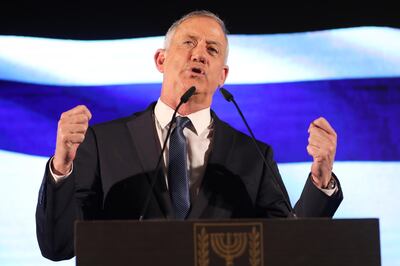On Tuesday, Israelis will head to the ballot box after another heated election season that saw allegations of corruption, sexual harassment, Iran ties, racism and leftism thrown around with abandon in a bid to win votes.
Now, Prime Minister Benjamin Netanyahu is vying for a fifth term in the hope of becoming the country’s longest-ever serving leader, surpassing the country’s founder David Ben-Gurion if he survives until November.
His early election call was provoked by a series of corruption cases and an impending indictment that have threatened to engulf that dream.
He ultimately rolled the dice on facing any corruption hearing with a fresh mandate as the newly-elected leader of Israel. If that backfires, he could face time in prison.
The vote has therefore become a referendum on Mr Netanyahu and whether the Israeli populace has had enough of "King Bibi".
But who is the political stalwart most threatened by and how serious is the risk to his leadership?
Benny Gantz, former Israeli military chief
The world will be watching to see if former Israeli military chief Benny Gantz can do enough to usurp Mr Netanyahu. The race is close.

The latest polls on Friday put his Blue and White Party – a coalition between three parties: his own, another headed by former military chief of staff Moshe Yalon, and centrist party led by former finance minister Yair Lapid – just ahead of the premier’s Likud party and he is set to win more seats than Mr Netanyahu.
Yet, Mr Netanyahu remains likely to be the man to secure a governing coalition. He has support from strong right-wing parties that propped him up in 2015 and are set to do so again.
Still, Mr Gantz is an individual with the closest polling to Mr Netanyahu since he re-entered the premiership in 2009. Israeli elections take place every four years, and each time they are seemingly defined by security, be it external or internal threats.
In 2015, Mr Netanyahu warned of Arabs heading to the polls in “droves” in a bid to scare Jewish Israelis into voting for his party.
His opponents have been easy prey for attacks on matters of security.
That has not been the case with Mr Gantz, a man with deep military experience, more so than Mr Netanyahu who has bragged that he bombed Gaza “back into the stone age” during the seven-week 2014 war, a message that plays with the country’s large right-wing voter bloc.
There have been rumours that Mr Gantz could even enter into a coalition with his rival, if he were to lose, but he has denied that possibility outright.
Palestinians have decried both candidates as one and the same and view Mr Gantz as a “Netanyahu-lite” candidate.
When do polls open?
The battle between Mr Netanyahu and Mr Gantz will dominant proceedings when polls open at 7am local time on Tuesday and voters choose from over 40 parties, a record number, to represent them in the Israeli parliament’s 120 seats.
Below the two heavyweights will be a jostling for votes between smaller parties that need to pass the 3.25 per cent threshold to enter parliament.
If any of the right-wing parties who plan to support Mr Netanyahu fail to meet this, then his chances of forming a workable coalition will be damaged.
Arab parties have been damaged by the break-up of the Arab Joint List, which was a coalition of four parties that finished third in the 2015 polls, and cannot expect the same success this time around.
When will the result be known?
The first exit polls will be released at 10pm local time and will provide an early indication as to who will be the next leader of Israel. But a certain outcome will still be unclear as rival parties negotiate over forming a coalition.
President Reuven Rivlin sanctions which party has the first attempt to form a coalition, after receiving elected parties' recommendations for prime minister.
So even if Mr Netanyahu falls shorter on seats than Mr Gantz, right-wing recommendations will likely see him given the first crack to reach the 61 seat mark again.
He would have 28 days to form that coalition, with a 14 day extension if approved by Mr Rivlin. If he fails to do so, then it would turn to Mr Gantz to form his own majority coalition.
What has Benjamin Netanyahu promised?
Mr Netanyahu has already made typically controversial moves ahead of the election in a bid to secure seats.
He has pledged to annex parts of the West Bank, bringing settlements under Israeli sovereignty if he wins and joined forces with a Jewish supremacist party.
He has tried to paint Mr Gantz as a leftist and Mr Gantz has accused his office in turn of leaking details about an alleged hack of his phone by Iran.
With one more day before polls close, and with the Israeli election race the closest it has been for years, there could be yet more political gamesmanship to come.







